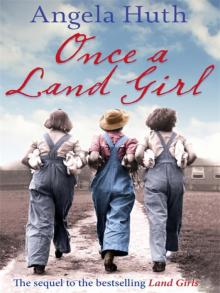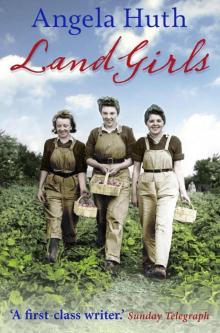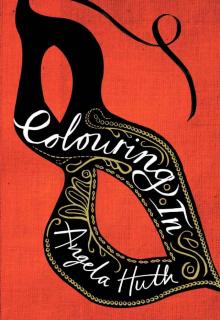- Home
- Angela Huth
Sun Child
Sun Child Read online
SUN CHILD
Angela Huth
Contents
One
Two
Three
Four
Five
Six
Seven
Eight
Nine
Ten
‘Children begin by loving their parents. After a time they judge them. Rarely, if ever, do they forgive them.’
Oscar Wilde A Woman Of No Importance
‘Childhood is measured by sounds and smells And sights, before the dark of reason grows.’
John Betjeman Summoned By Bells
One
From where she sat in the long grass Emily Harris could see her parents laughing. She couldn’t hear the laughter because the kitchen window was shut, but their inaudible joke added to the niceness of the afternoon.
Out here it was sunny, very bright, after the husky brown light of the loft in the barn. It was only after lunch Emily had found this new loft. She was still finding new things most days, but the loft was the best discovery yet. The barn itself she already knew well, and loved: the piles of mouldy hay, the rusty bicycle, the rotting tyres, the donkey cart with Ada loves Charlie on its side, and the wobbly ladder that led up to the hole of impenetrable blackness.
This afternoon Emily had dared at last to climb that ladder. At the top, she stayed for a while on her hands and knees, cautiously feeling about the floorboards. Her fingers bumped over scabs of dried pigeon dirt and flinched away from splinters. When she became accustomed to the light she stood up and looked about her, knees trembling a little. There wasn’t much to see. A pile of empty sacks, a page of yellow newspaper, a small plastic boat, a horrible red even in the gloom. The place, Emily felt at once, had prospects, but should be contemplated elsewhere. Quickly she climbed back down the ladder and returned to the garden. There, crouching in her hideout of grass, she listened to the small jet zooms of bees, drunk on pollen, as they flew indeterminately back and forth from flower to flower. She felt the sun, and she felt the warmth of her parents’ laughter.
Last summer, it had all been very different. Then, they were still living in a stuffy London flat with long white moiré passages and aubergine carpets. She didn’t see her parents much, just the early mornings, some evenings before bed, the occasional whole weekend. True, they all had breakfast together, every day. Idle, Emily’s father, insisted upon that. They ate in the blue silk dining room – mostly in silence. Idle would read the newspaper as he ate, very neat in his dark suit, a perpetual frown on his kind, creased face. Fen, her mother, would be in her dressing gown, hair unbrushed but shining, gazing out of the window, taking a long time over a triangle of anaemic toast. Occasionally she would break the silence by asking Emily some impossible question: what was she going to do at school today?
Some mornings Emily felt that her mother was really interested, genuinely wanting to know that sums, dictation and painting were the order of the morning, and she would reply conscientiously. Other days the question sounded automatic, and Emily would hear herself saying peevishly:
‘You must remember by now it’s gym on Tuesdays. I’ve told you.’
‘I always forget,’ Fen would smile. In London, her mind was on so many things.
It was at breakfast one morning that Fen had found a perfect country house advertised in the paper. She gave a wild yelp of pleasure, startling both Emily and her father. From the three line description of the house she could tell, she said, there was no possibility of there being anything wrong with it. Wouldn’t it be marvellous? The solution to their lives? She would go and see it at once, this morning. No point in delaying. She jumped in the air, shouting with uncontainable delight.
‘Really, Mama,’ said Emily, who was used to her mother’s exuberances, but never quite used to the speed with which they came and went. Idle merely smiled and encouraged his wife to go, at once.
The following day breakfast was no less dull. Fen had made an offer for the house. It was now only a matter of planning and impatient waiting.
Emily was pleased by the thought of leaving London. For her, it had always been a bleak life there. She was looked after by a devoted but stupid Danish au pair girl called Angelica, who had a heavy gold moustache and smelt when she moved her arms. Emily and Angelica spent every afternoon after school together. As Angelica’s idea of adventure was limited to the Round Pond, they went there each day. Emily came to hate park life: the prim, clipped sheet of water crowded with its miniature yachts, just as she grew to hate the feeble sound of wailing Nannies – at least Angelica was better than them – whose cries of warning nagged the air.
Every afternoon the routine was the same. After three turns round the pond (two on rainy days) Emily and Angelica would return to the flat. While Angelica screwed her key round in the lock Emily dreaded the silence, and the smell of central heating, that she knew awaited them on the other side of the door. Angelica would prepare the sliced-bread sandwiches – Marmite one day, peanut butter the next, with a few chocolate biscuits and a dreary bought cake. Because Angelica was on a permanent diet, Emily was forced to eat by herself. Angelica sat at the other end of the white formica table, enviously watching her every mouthful.
‘Not more than two biscuits,’ was her daily admonition, ‘or you’ll get big and fat like me.’ Sometimes, Emily shuddered.
Occasionally, she would bring a schoolfriend home for tea. Although they anticipated interesting games on the way home, when they actually arrived at the flat something of its deadness subdued them. They would abandon their plans and, disconsolate, watch television instead.
Occasionally, Fen would be home. Usually on the telephone. If she wasn’t on the telephone, and had nothing else to do, Emily would be treated to the best hour of her day.
‘Let’s do something, Em,’ Fen would say. ‘What shall it be today?’ (As if they were confronted by the problem every day.) Then, gay and enthusiastic, she would think of something. They would paint huge pictures together, water colours. Fen was particularly good at skies. She showed Emily how to wet the paper with a large brush, then run blues and greys into the water, leaving natural clouds to form. Emily was better at reflections. She liked to do castles with lighted windows beside lakes. She would turn the picture upside down and draw the reflection, rather more shakily than the actual castle, and make the lights smudgy in the water. Sometimes, they combined on a painting. Storms were their favourite subjects. Fen would streak a thunderous sky with silver lightning, while Emily purpled the hills with shadows, and put in one tiny old man, alone in all this violence, bent double by the rain. Between them, they would make the kind of mess that turned Angelica to despair. And then, with one accord, at precisely the same moment, they would abandon their paints, turn on loud music and dance. Fen would kick off her shoes, twirl Emily around, sing in a funny voice which Emily tried to imitate. The room, so often dormant, would come alive.
Best of all were the occasions when Fen let Emily come and help her dress for the evening. In London, Fen and Idle were out most nights. Emily would stand at the dressing table and watch the mysterious process of her mother transforming herself from a near-beautiful, uncared for woman, to a woman of almost haughty grandeur. Fen would pile up her hair, leaving little wisps to curl about her ears. She would ponder about earrings.
‘Which ones, tonight, do you think?’ she always asked, most seriously, convincing Emily that she required her choice. Emily would run her fingers along the spiky shapes of jewels in the velvet-lined box. She never knew which ones she liked best.
‘The purple ones.’ She handed her mother a pair of amethyst earrings surrounded by diamonds.
‘Why not? They’re Papa’s favourites. He gave them to me years before we were married. He sent them to me in a parcel
with no note. But of course I guessed.’ She pierced the earring through the invisible hole in her blue-white lobe.
‘Were you and Papa together years and years before you were married?’ Emily was forever trying to pierce together her parents’ past.
‘Only two years.’
‘Did you have any other boyfriends?’ Fen smiled at herself in the glass.
‘One or two. Well – lots and lots.’
‘But none so good as Papa or you wouldn’t have married him?’
‘None so good as Papa, or I wouldn’t have married him.’ This time Fen smiled at the reflection of her daughter, as well as herself. A proper smile, with teeth showing and tiny lines round her eyes.
Idle came into the room. He stopped at the door. He seemed amazed, confused, by the reflection of his wife’s beauty through the looking glass.
‘I hate to have to tell you to hurry,’ said Fen, ‘but we’re meant to be there by eight thirty.’ She was at once apologetic and beguiling. A look of extreme weariness passed over Idle’s face, but he hurried off to change.
Later, when Emily was in bed, they would come and say goodnight before leaving. In the semi-darkness of her room they would be glamorous figures: Idle tall and wide in his dark velvet jacket, his marvellous face and silver hair patterned with shadows; Fen in a wispy dress of peacock colours that floated like underwater plants when she moved.
‘Night, darling. We’ll tell you all about it in the morning.’ When Fen stood up from kissing Emily she left in the air a smell of stephanotis. Emily would wrinkle her nose with pleasure.
Before going to sleep, she would try to imagine their evening. What sort of people would they talk to? What would they eat and drink? She had a hazy picture in her mind of a kind of pantomime palace in which tables were crusted with brilliant food and golden goblets filled with wine. Her father, for some reason, wore a powdered wig, and his trousers had turned to knickerbockers. The light of a huge chandelier full upon him, he would run down a flight of curved stairs, and begin to search among the masked dancing women. Suddenly he would notice a shy lady by herself, hiding behind a pillar. He would drag her from her hiding place, unmask her. It was Fen. They would both begin to laugh, and to dance, faster and faster, old fashioned waltzing, till everyone else stopped to watch as they spun round the empty floor, and applause came in a great burst, almost drowning the orchestra.
But next morning, Fen and Idle always forgot to tell her what it had really been like. Their warmth of the night before always seemed a little frozen in the morning. It wasn’t their time for concentrating on her. In London, they were forever preoccupied by other things. They didn’t laugh, there, nearly as much as they did now.
The church clock struck five. Emily knew that at any moment her father would come striding out to find her, hoist her on his shoulders, and quickly involve her in one of his innocent conspiracies.
As she expected, he came. He wore a blue silk shirt, the colour of the sky. It was open-necked and the sleeves were rolled up, but it couldn’t be disguised. It was a London shirt. Idle hadn’t yet been able to bring himself to wear country clothes.
‘Emily!’ He strode towards the patch of sunflowers, some taller than him, that grew near the barn.
‘I’m here!’ He changed his direction. She could see him, still he couldn’t see her. The grass crushed under his feet, making a quiet cracking noise.
‘You’re always changing your hiding places. You confuse me,’ he said. He helped her to her feet. ‘Where did all those cobwebs come from?’
‘I went up to the loft in the barn.’
‘Don’t you remember? I told you. That ladder’s dangerous.’
‘I was very careful.’
‘You mustn’t go again till I’ve tried it.’
‘I was trying it for you.’ She looked at his momentarily stern face. ‘All right.’
‘Promise ?’
‘Promise.’ Idle stooped down and began brushing the cobwebs from her shoulders and long gold hair.
‘Now listen. I’ve something to tell you.’ His voice lowered conspiratorially. ‘Mama has made a chocolate cake – the most dreadful chocolate cake you ever saw.’ Emily giggled at his seriousness. ‘But the thing is, she tried very hard, and we don’t want her to think we don’t like it, do we?’
‘No,’ said Emily.
‘So the plan is this. We eat it. We might even ask for more. And we tell her it’s delicious. You understand?’
‘Yes.’
‘You’ll stick to the plan?’
‘All right, if you do.’
‘Of course I will.’
Emily giggled again and braced herself for secrecy. She always enjoyed her father’s plans.
‘I promise,’ she said. ‘It’ll be a secret.’
‘Right, then. Up?’ With a practised leap Emily bounded on to his wide shoulders, feeling the warm, soft silk of his shirt beneath her bare legs. ‘You high in the sky?’
‘Highest ever!’ With one hand she grabbed hold of a clump of her father’s hair. The other arm she whirled round like the sail of a windmill. ‘I’ve never been so high,’ she shouted. She let the clouds spin dizzily about her head, holding her face up to them, feeling their whiteness right through her eyes. These rides had become a habit since they had been in this house. They were always exciting, but best on days when the clouds were hard-edged, racing against a taut blue sky, undisturbing it, like today.
At the kitchen door, which opened on to a rough stone terrace, Idle let Emily slide to the ground. The stone was warm under her bare feet. Bantams jerked about, clucking, pecking. She stood quite still for a moment, getting used to the ground again. Then she followed her father.
After all the sun outside, the kitchen was dim, the quarry tiles cool. Fen, also barefoot, was bending down by the Aga, two tins of deflated cake in her hands. The sun, low in the windows, had outlined one side of her long, honey coloured dress, making it shimmery with gold until Emily had refocused her eyes. Fen laughed when she saw them.
‘We’ll be having a thin, crisp cake,’ she said. ‘A sort of giant biscuit.’
Emily and her father exchanged a private look.
‘Good,’ said Idle. ‘If there’s one thing I really hate it’s a professional cake.’
He didn’t care one way or another about food of any kind. Triumphs or disasters in the kitchen left him equally unmoved. But his wife’s reactions to both amused him. He was smiling down at her, arms folded, eyes tired. Since eight that morning he had been writing a report on the economic situation of one of the underdeveloped countries into which he was researching on behalf of the government. He wrote slowly, laboriously, by hand, reading each page as he finished it and crossing out the occasional adjective. His English master at school, he remembered, said that unless you had a flair for adjectives they were dangerous. So Idle took no risks in his reports. Now that he had finished this one, thirty pages, he had writer’s cramp. Also, his head ached.
‘Can I do anything?’ he asked.
‘No, leave it.’
He liked coming into the warm mess of the kitchen, where he was never expected to help, after the solitude of his study. He liked the unconscious placing of things that seemed to go well together on the dresser – the bowl of brown eggs, the huge washstand jug of tumbling dried flowers and whiskery corn, the basket of bright wools bought by Fen in a one-day fit of wanting to crochet. In spite of being almost obsessively orderly himself, here, he enjoyed the chaos. Occasionally, perhaps to please him, Fen had days of inspired tidiness. She would wake full of good resolutions, and spend the whole day scrubbing, polishing and dusting. By evening she was exhausted and depressed. The resulting neatness did not please her. She found no pleasure in Idle’s praise. By nature she was untidy, and happy in her untidiness.
Now she went to the kitchen table, pushed away a pile of unwashed plates, a lump of melting butter and a dish of cold sprouts, and dumped down the two cake tins. She began to edge round them with a shar
p knife.
‘Have you finished for today?’ she asked. She wasn’t concentrating very hard on either the question or the cakes. ‘You must be starved. Only those filthy sandwiches for lunch. I wish you didn’t have to work every weekend.’ She turned the two frazzled discs of cakes on to the table and looked up at Idle smiling. ‘Well, you can’t say I’m not trying, can you?’
‘You’re doing very well.’ He stepped towards her, pushed the long tousled hair out of her eyes, and ran his hand over her face. ‘Why’s your face on fire?’
‘Frustration.’ She pouted, childlike, for a moment. ‘You see I like the idea of cooking – I never thought I would, but I do. In practice, though, it never seems to work out. I mean look at this mess. Would you believe it, for one cake?’
They both looked at the sink high with saucepans, chocolate streaked spoons and bowls. Idle began to laugh. Fen could never resist his laughter. In response she flung herself against him, threw back her head, lifted her arms round his neck and laughed too. They stood like that for a while, clutching each other, rocking back and forth, till Idle pushed Fen gently away to look at her again.
‘You most beautiful prize ridiculous idiot,’ he said.
‘Certainly I’m not a cake maker,’ Fen replied. Emily, at the table, was picking up crumbs of chocolate sponge, tasting them.
‘Oh yes you are,’ she said.
Later, they heard outside the unmistakeable sound of Uncle Tom’s car in the drive. Uncle Tom, Fen’s brother, was fiercely loyal to his car. It was a shabby old blue Mercedes, its limp exhaust pipe held up with a leather belt which once had had as aristocratic origins as the car itself. One of Emily’s greatest pleasures was to be taken for a ride in it, alone with Uncle Tom, the hood down, hair blowing in the wind.
With a shriek of delight she ran from the kitchen to greet him. Idle followed her.
‘Why have you come, Uncle Tom? What a surprise!’
‘I was just passing.’ Tom got out of the car and enveloped Emily in a hug. He wore jeans, and a wispy Indian scarf round his throat. His hair was almost as long and wild as Fen’s, but curlier. His narrow face, beautiful in repose, was endearingly impudent when he smiled, as he did now.

 Sun Child
Sun Child South of the Lights
South of the Lights Virginia Fly is Drowning
Virginia Fly is Drowning Of Love and Slaughter
Of Love and Slaughter Such Visitors
Such Visitors Once a Land Girl
Once a Land Girl Land Girls
Land Girls Colouring In
Colouring In Nowhere Girl
Nowhere Girl Monday Lunch in Fairyland and Other Stories
Monday Lunch in Fairyland and Other Stories Another Kind of Cinderella and Other Stories
Another Kind of Cinderella and Other Stories Invitation to the Married Life
Invitation to the Married Life Easy Silence
Easy Silence